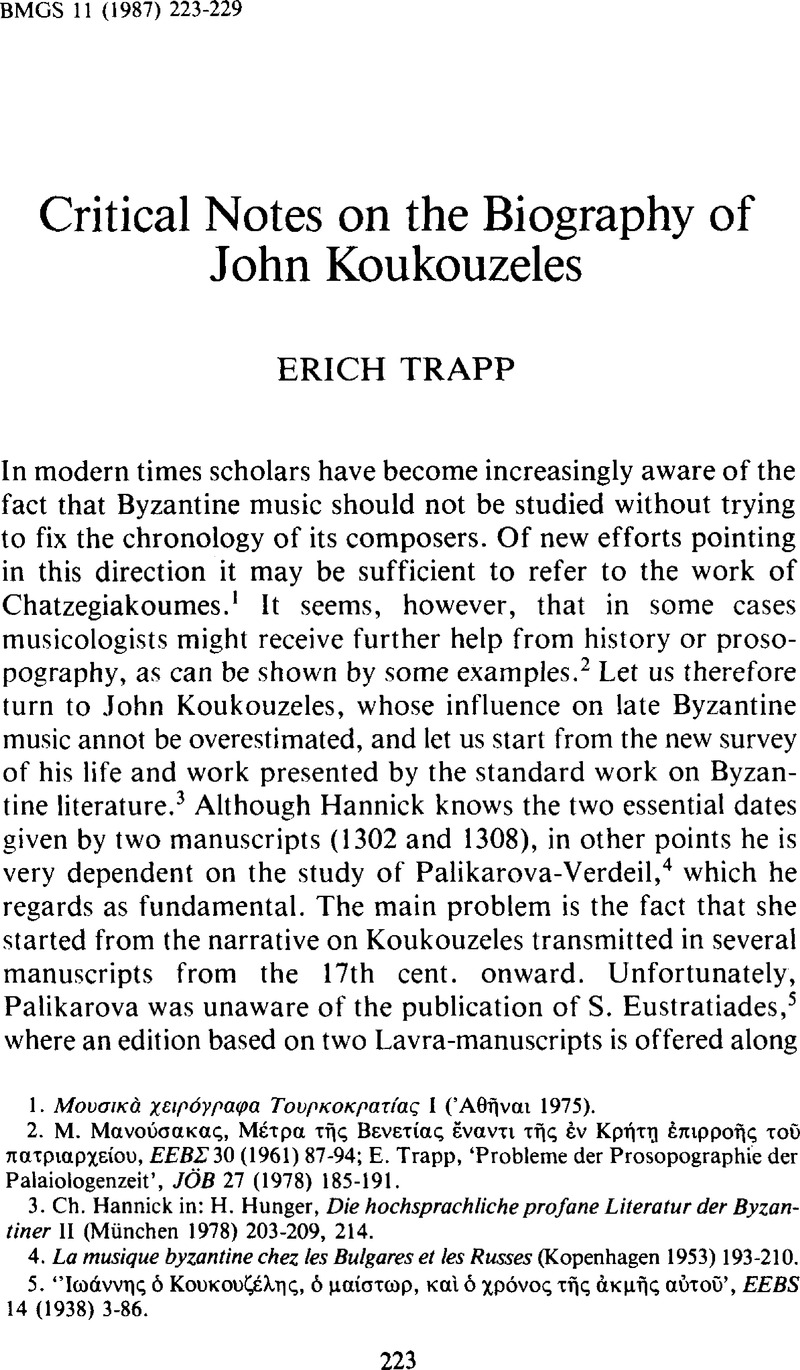Published online by Cambridge University Press: 22 January 2016

1.
![]() (1975).
(1975).
2. M. ![]()
![]() (1961) 87-94;
Trapp, E., ‘Probleme der Prosopographie der Palaiologenzeit’, JÖB
27 (1978) 185–191.Google Scholar
(1961) 87-94;
Trapp, E., ‘Probleme der Prosopographie der Palaiologenzeit’, JÖB
27 (1978) 185–191.Google Scholar
3. Ch. Hannick in: Hunger, H., Die hochsprachliche profane Literatur der Byzan-tiner II (München 1978) 203-209, 214.Google Scholar
4. La musique byzantine chez les Bulgares et les Russes (Kopenhagen 1953) 193-210.
5.
![]() EEBS 14 (1938) 3-86.
EEBS 14 (1938) 3-86.
6. l.c.201f.
7. Trapp, E. (in collaboration with H.-V. Beyer and others), Prosopographisches Lexikon der Palaiologenzeit (henceforward quoted as PLP) VI (Vienna 1983) nr. 13412.Google Scholar
8. PLP V 11929f.
9. rather than ‘artichoke’ supposed by Kriaras in his Lexikon, because that would be to positive an object.
10. Hunger, H. — Kresten, O., >Kalalog der griechischen Handschriften der Õsterr. Nationalbibliothek III/I, (Wien 1976) 12.Google Scholar
11. Thibaut, J.-B., Monuments de la notation ekphonétique et hagiopolite de l’église grecque (Petersburg 1913), 126 Google Scholar; Granstrem, E., ‘Katalog greceskich rukopisej Lenin-gradskich chranilisc, VV25 (1964) 204 Google Scholar Hn.s.
12. Benesevic, V., Catalogus codd, mss. graec. qui in Monte Sina asservantur I (Petersburg 1911) 157.Google Scholar
13. Babinger, F., Mehmed der Eroberer und seine Zeit (Müchen 1953)Google Scholar 3f.
14. PLP I 980; Chatzegiakoumes 1.c.264f., 322; G. Stathes, ![]()
![]() (1975) 288.
(1975) 288.
15. Stathes 1.c.657.
16. PLP II 2819.
17. Thibaut 1.c.89.
18. PLP VI 13243; Chatzegiakumes 1.c.316-321.
19. pp. 16-21; Eustratiades, who was not aware of the three early manuscripts, jumped to this conclusion on the basis of later unproved testimony.
20. Thibaut (p.126) thinks-that two marginal notes ![]() refer to Koukouzeles, but it is more likely a hint to an author of hymnography perhaps to John of Damaskus (cf. Beck, Kirche 485). Furthermore it would contradict the indication given by Chatzegiakumes (p.327)
refer to Koukouzeles, but it is more likely a hint to an author of hymnography perhaps to John of Damaskus (cf. Beck, Kirche 485). Furthermore it would contradict the indication given by Chatzegiakumes (p.327) ![]()
![]() which for its part dates back only to the 18th century; compare also
Jakovljevic, A., ‘Inventar muzickih rukopisa manastira Hilandara’, Hilandarski Zbornik
4 (1978) 210
Google Scholar
which for its part dates back only to the 18th century; compare also
Jakovljevic, A., ‘Inventar muzickih rukopisa manastira Hilandara’, Hilandarski Zbornik
4 (1978) 210
Google Scholar
![]() (likewise from an 18th century ms.).
(likewise from an 18th century ms.).
21. Tunickij, N., Monumenta ad SS Cyrilli et Mfthodii successorum vitas resque gestaspertinentia, (London repr 1972) 1–40 Google Scholar; Trapp, E., ‘Die Viten des hl. Naum von Ochrid’, BS 35 (1974) 161–185 Google Scholar; Trapp, E, ‘Die sieben Slavenapostel in der liturgischen Dichtung’, AB 100 (1982) 469–483.Google Scholar
22. Jakovljevic, A., ‘Koukouzeles’ part in the funeral service of mediaeval Serbia and Byzantium’, Cyrillomethodianum 1 (1971) 130.Google Scholar
23. More than four years ago sent to Macedonian Studies (New Delhi), the present article could not be printed for lack of Greek letters. I am very obliged to the editor that it can appear now, brought up to date in a few points. Modern bibliography on Koukouzeles: PLP VI 13391;
Jakovlevic, A., ![]()
![]() 14 (1982) 357–374
Google Scholar;
Tonceva, E., ‘Das Polyeleos-Gesangwerk Joannes Kukuzeles’, Mitteil. des Bulgar. Forschungsinstituts in Ôsterreich 2/V1 (1984) 59–74
Google Scholar. The attempt of S. Karas has to be considered as a failure
14 (1982) 357–374
Google Scholar;
Tonceva, E., ‘Das Polyeleos-Gesangwerk Joannes Kukuzeles’, Mitteil. des Bulgar. Forschungsinstituts in Ôsterreich 2/V1 (1984) 59–74
Google Scholar. The attempt of S. Karas has to be considered as a failure ![]() Actes du XVa congr. int. d’ét. byz. II (Athens 1981) 973-984) who, following G. Papadopoulos, again tried to put Koukouzeles back to the 12th century. Apparently he was not aware of the clear note quoted above (cod. Petrop. 121, f. 148v).
Actes du XVa congr. int. d’ét. byz. II (Athens 1981) 973-984) who, following G. Papadopoulos, again tried to put Koukouzeles back to the 12th century. Apparently he was not aware of the clear note quoted above (cod. Petrop. 121, f. 148v).